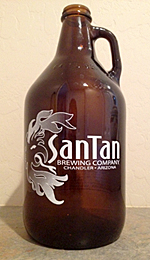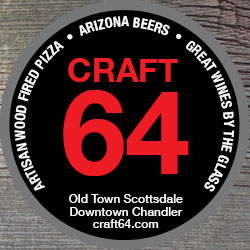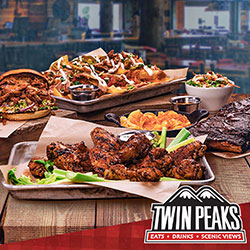The Arizona Craft Brewers Guild batted .500 during the recent session of the Arizona Legislature – winning one battle and losing another, at least for this year.
 The victory was a change in the state’s rules concerning growlers, those refillable one-gallon or half-gallon containers (pictured) used to purchase draft beer.
The victory was a change in the state’s rules concerning growlers, those refillable one-gallon or half-gallon containers (pictured) used to purchase draft beer.
When first legalized in Arizona in 2012, all growlers were required to be made of glass.
This year, the guild pushed through a change allowing growlers to also be made of stainlesss steel, ceramic, or any other material approved by a national sanitation foundation.
Stainless steel growlers are lighter than glass growlers. They also are allowed some places where glass containers are not, such as Arizona lakes and rivers.
Assuming Gov. Brewer doesn’t veto the bill – which is not expected – you’ll be able to legally fill your stainless steel growlers starting in late July.
Microbrewery licenses unchanged
The guild’s other proposal this year – lifting the 40,000-barrel capacity limit on Arizona breweries – failed to make the annual “liquor omnibus” bill that includes any changes involving beer, wine, or spirits.
The issue is a little technical: Arizona basically offers two types of licenses for microbreweries. Every current Arizona microbrewery has a Series 3 license, also known as a microbrewery license.
A Series 3 license allows a microbrewery to sell beer to the public – via a brewpub or taproom, for example – but caps its production at 40,000 barrels per year.
A brewery that wants to brew more than 40,000 barrels can switch to a Series 1 license, also known as a producer license. Under a Series 1, a brewery has no capacity limit, but cannot operate a restaurant or other retail location.
Arizona’s two largest breweries – Four Peaks and SanTan – conceivably could reach the capacity limit in a few years and be confronted with a stark choice: Stop growing their businesses, or close their brewpubs.
Looking ahead to next year
“If breweries like Four Peaks and SanTan Brewing Company have to close down their restaurant and retail components, imagine how many jobs would be lost – not to mention the effect it would have on surrounding communities who would lose some of their favorite spots,†guild director Rob Fullmer says.
The guild hopes to reach a compromise with those opposed to the change before next year’s legislative session. A key may be negotiating a limit on the number of retail locations an uncapped brewery can operate.
“Our solution … allows a microbrewery to achieve producer status without having to close down successful restaurants that are instrumental to establishing and promoting a microbrewery’s product,” says guild lobbyist Camila Alarcon.
The guild also is working on plans to enlist the state’s craft beer community to help educate state lawmakers before next year’s session.
 Subscribe to the free MXSW Daily Email here for the latest news about food & drink in the Phoenix metro area.
Subscribe to the free MXSW Daily Email here for the latest news about food & drink in the Phoenix metro area. 




















